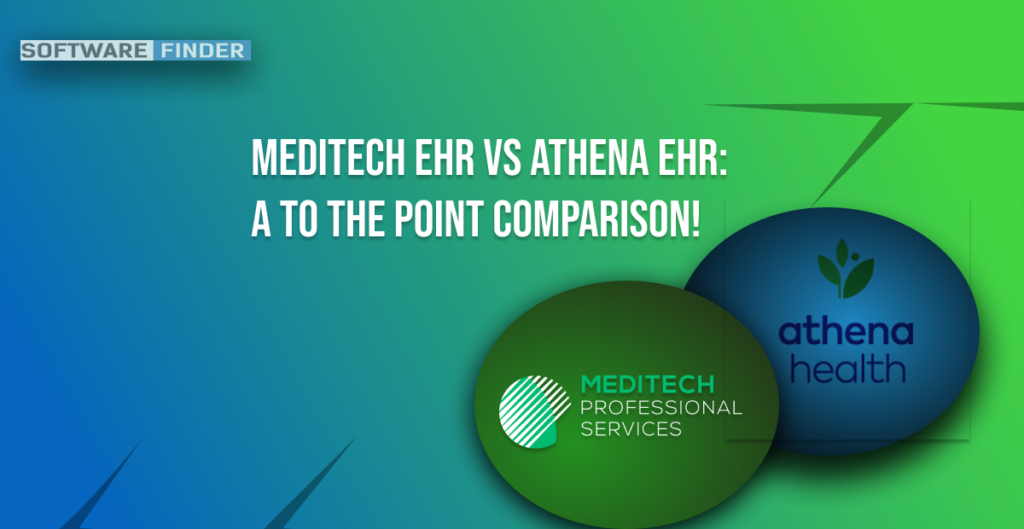These days, the healthcare industry is all about creating new and better possibilities. Therefore, all EHR solutions need to be innovative to survive in this competitive market. Turning down all the challenges of the medical industry, two EHR vendors that sustained their position are Meditech and Athena EMR. A comparison between the two will lay open all the salient facts for you. So, are you ready to digest a detailed Meditech vs Athena comparison?
Meditech EHR vs Athena EHR:
Reviews:
Getting detailed insights is possible only by evaluating the reviews of Athena EMR and Meditech EHR. In this Meditech vs Athena comparison. Presenting a detailed reviews analysis is not possible, so for now, we will stick with the critical features and capabilities of Athena EMR, and Meditech EHR highlighted in the reviews.
Athena EHR Reviews:
Athena EHR scores 4.5 out of 5-star reviews rating on credible EHR evaluation websites. This above-average rating illustrates that it is a reputed ERH platform. It functions smoothly so physicians can work facing no disruption in the clinical workflow. There are many things customers adore about this vendor. So, let’s have a keen glance at the reviews of Athena EMR.
Athena EHR is well-equipped with all the healthcare regulations and stays one step ahead of its contenders.
Using its automated reminders services, practices believe their last-minute cancellations have reached a historical record of minimum no-shows.
The claims management module of Athena medical software works to assure first-pass claims resolution maximizing the profitability rate.
90% of the reviews claim that the customer support of Athena EMR is unbeatable. Athena software provides support for clients who can’t get started with ease.
Another thing users mentioned in the reviews is that they never faced any significant downtime using Athena EMR. They were always able to access their desired services timely.
Meditech EHR Reviews:
As for Meditech EHR, this platform scores an average of 4.2 out of 5-star reviews. So even though it’s less than Athena’s score, it’s pretty satisfactory. A rating above 4-star means Meditech is a reliable EHR solution that values the client’s desires and functions accordingly. Here’s what the reviews say about Meditech EHR:
It is a user-friendly solution with an easy-to-navigate interface and an impressive layout.
The features of Meditech EHR work on a diverse level, catering to the needs of over 20 specialties.
The vendor supports HIPAA-compliant services, so care providers have nothing to worry about. They don’t have to stress over staying compliant with the regulatory conditions.
Meditech EHR features a robust billing tool to handle the billing cycle flawlessly, leaving no loose ends in bill creation and submission.
Reviews state Meditech EHR is highly scalable; thus, care practices can grow consistently without losing their credibility.
The Demo Analysis:
The demo of EHR platforms is als0o of utter significance. There’s no way you can get a clear idea about the services of healthcare vendors if not for the demo. Furthermore, it is the only way you can evaluate its services according to your clinical requirements. So, let’s assess the demonstration tutorials in this Meditech vs Athena comparison.
Athena EHR Demo:
Athena EHR software believes in helping clients excel at a fast pace while maintaining the best clinical performance. And for that, it provides the facility of personalized demo tutorials. In addition, clients can get in touch with the product sales team over call to tell them their preferences. Also, the demo of Athena EMR is set based on the scale of the medical centers. It is because the needs of medical practices vary with their size. Users having experienced the Athenahealth EHR demo say it’s highly informative and impressive.
Meditech EMR Demo:
The demo of Meditech ERM is also very well presented. It is not customized but covers all the clinical aspects keenly with profound knowledge of the industry’s challenges. The services of Meditech EMR are explained with a fine choice of words to compel the viewers. Meditech EMR demo is readily available at the client’s request. It is shown in the demo how Meditech supports transformational changes to help practices accomplish their dreams.
Athena EHR and Meditech EHR Pricing:
Undoubtedly, pricing is a worth-considering element while making a purchasing decision, and EHR solutions are no exception. But there’s no point pondering over this element in the Meditech vs Athena comparison. As for why Athenahealth EHR and Meditech EHR software have not made their cost plans public. We know only what the users say about these solutions. And that is:
Athena medical software is indeed a customer-oriented solution. The vendor provides a percentage-based cost structure for clients instead of offering fixed pricing plans. This way, Athena medical software assures no client is overcharged. Furthermore, this percentage-based model is coupled with custom-built plans, which shows the vendor truly values its customers’ money.
We surely know Meditech EHR software is making a difference in this world. But at what expense? This fact is not revealed. Users say it is a bit expensive solution, but its salient offerings make up for that. Clients believe the features of Meditech EHR make up for its hefty price tag, but still, it is not a budget-friendly solution for small-scale practices.
The Final Showdown:
We explored all the essential aspects of EHR solutions in this Meditech vs Athena comparison. We can say that Athena is a cost-friendly solution for all-sized practices. Meditech EHR is also a reliable platform, but it’s out of the pockets of small practices. This is the major downside of this vendor. Athena also has a bright and a dark side, but its brighter one takes over the darker one. Besides the reviews, there’s the demo of Meditech EMR and Athena,
Athena’s demonstration tutorial is customizable, giving it one more point over Meditech EHR. Both platforms aid medical professionals instead of overwhelming them with complex workflows. They help with predictive diagnosis and feature voice recognition to enhance the patient experience. Another commonality among these two is that they come with population health services to recognize local trends to shape the care outcomes.

























































